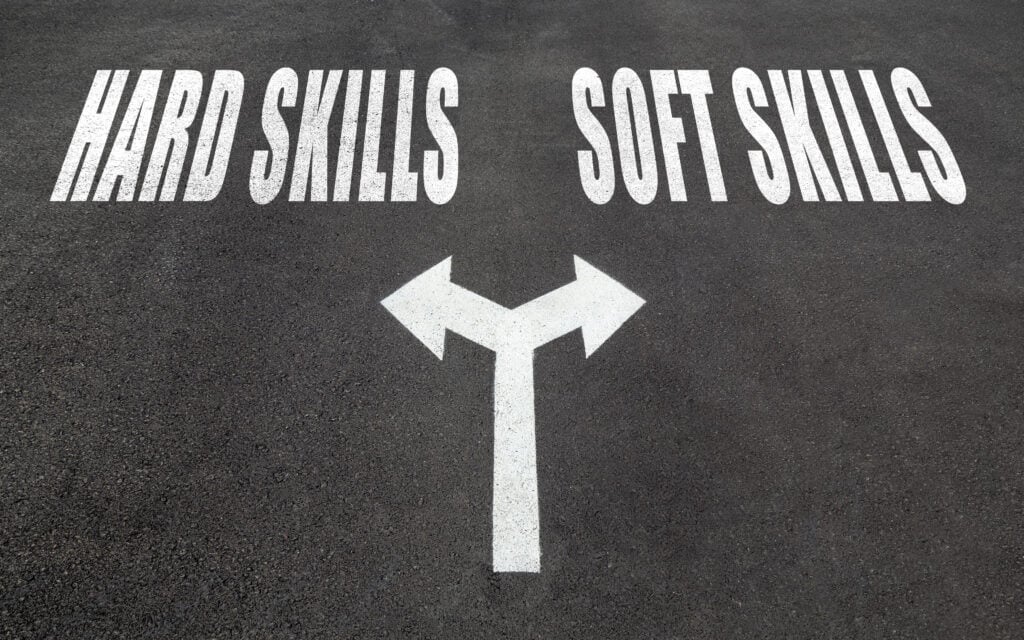Your key skills section tells employers that you have the qualifications needed to excel in the job. Employers also pay particular attention to your resume's skills section to decide whether you can go on to the next phase in the recruiting process. This article explains the essential skills to have and tips on how to craft your "Key skills" section on Drjobs effectively, and all what you need to answer your "What should I write in the (Key skills) section on Drjobs?" question.
What are the different types of skills you should mention in your resume?

Hard skills are strengths that are relevant to the work and the industry. You usually learn more specialized skills in college, certification programs, on-job training, or work experience. Hard skills may provide proficiency in areas such as translation, languages, IT, programming.
Soft skills are skills that can be integrated into any role. Soft skills can also be referred to as "people skills" or "social skills" that provide competence in public speaking, decision making, critical thinking, and adaptability, for example.
Typically, hard skills are taught while soft skills are often more challenging to learn because they are usually personality attributes and highly valuable to employers.
Hard skills, on resumes, explain what you can do. Soft skills show how the tasks will be done. Soft skills convert you from being a robot working to a human with nontangible skills.
Your soft skills will improve your hard skills in most situations. For instance, if you're a professional software developer, you'll probably be able to detect mistakes and fix bugs with the code you and your team create.
What are more important soft skills or hard skills?
As a job seeker, to put yourself as a well-rounded candidate, it is vital to showcase the best hard and soft skills. In the next interview, it is also essential to understand how the two forms of skills connect and the position to communicate them.
Why should I fill the skills section in my profile?

Well-put-together skills will help a recruiter find out so easily if you have what it takes for the position. Here, speed matters.
Why? Most recruiters spend only 6 seconds to determine if the resume is worth reading in full or no. That means that you have about six seconds to highlight the essential points. If you failed, your resume would end up in the landfill.
With that in mind, you can prove how much you will be beneficial to the company through your skills. You will help the hiring manager to decide whether you can add more to the table quickly.
How to pinpoint your best strengths to mention in your Drjobs Profile?

It's time to find out how you can integrate these skills into your profile now that you realize what kinds of skills are essential and the distinction between technical and soft skills. You can't mention every single skill you have, so you're going to have to be selective about picking the most important ones for the job you're applying for.
- Consider your past experiences
- Check the awards and milestones of your career
- Ask previous colleagues or classmates
- Get in touch with field professionals
How to build a list of key skills tailored to the job posting on Drjobs?

- Check the company's job description and culture
Begin by reading the job description and taking note of any skills or abilities needed that meet your own. Consider the description of the company and its culture, in addition to work requirements.
Check out the company profile on Drjobs or search the employer's website for more details if you do not find any hints to the company culture mentioned in the job description.
Your list of resume skills aims to convey to the recruiter or hiring manager that you are the right choice for the job and can offer their team an added value. You will comfortably succeed in getting the job by paying attention to the skills that recruiters are looking for and creating correlations to your strengths.
- Highlight your skills that are important to the job you're pursuing
By doing this, you will show recruiters that you're specifically made for this role, and you will convince resume-screening bots (ATS) that screen resumes for relevant keywords.
- List all your relevant skills to the position
Study the job summary thoughtfully. Pay attention to the " job requirements" or "Main Skills."
Look for words and phrases related to skills such as "business analysis," "Knowledge of XYZ software," "video production," etc. write them down.
Compare the qualifications set of what you see in the job ad. Both the matching ones have to go on your application.
- Weave into your Drjobs profile the most important skills
The Summary you add to your profile is like " A cherry on top." It aims to give your career an outline and clarify why you are the perfect candidate.
You can write it as either a resume summary (for experienced candidates) or a resume objective (for entry-level job seekers), depending on the career level.
- Make sure that the most in-demand skills are highlighted
Add them smartly to your profile if you are a professional, even though the job Ad does not explicitly ask for it.
In light of this, LinkedIn Learning released a report identifying the top 25 skills for employers today; some of them are:
- Cloud Computing
- Artificial Intelligence
- Analytical Reasoning
- People Management
- UX Design
- Mobile Application Development
- Video Production
- Sales Leadership
- Translation
- Audio Production
- Natural Language Processing
- Scientific Computing
- Use LinkedIn to discover more about the skills
How many skills can you list on Drjobs?
Depending on how much you want to present to the hiring managers, you can list 5 to 10 skills. Divide these ten between software knowledge (if found), hard skills, and soft skills.
ATS robots will scan your application first

- Mirror the job posting to impress the robot
Fortunately, your application skills portion will help you convince the robot that reads your resume easily.
For closer (human) evaluation, an ATS flags a resume by searching it for specific keywords. Luckily, a relatively significant number of these keywords are used in every vital skills section and can help you get invited to a job interview.
Sticking to the job posting is the best approach. Highlight and pick all the skills that are relevant to the job. These are the keywords that will be scanned for by both the recruiting managers and ATS.
What are the skills that I shouldn't mention in my resume?

Outdated skills. You know how to fix a fax machine? Nice, but don't place your resume on it. You don't want to be as outdated as fax machines are. Avoid every skill relevant to other obsolete technologies.
Irrelevant skills. Handmade crafting is an impressive skill to have. But it's also utterly irrelevant if you're applying for a job in a recruitment company. Remember, hiring managers only have limited seconds to review. Make sure your skills meet their needs that can get you the job.
Overused buzzwords. Are you a good communicator? Are you passionately working, always self-motivated, and adaptable? Even if it's true, don't mention it. These overused words in job applications bother the hiring managers, and they are tired of seeing them. What's more, these buzzwords don't mean anything.
Now, Did you learn anything from this article? Did you find the answer to What should I write in (Key skills) section on Drjobs? If you need any further assistance, let's contact in the comments box below.
For a dream career, click here.







 2023-03-22
2023-03-22
 2022-10-11
2022-10-11
 2022-09-25
2022-09-25
 2022-09-14
2022-09-14
 2022-09-11
2022-09-11